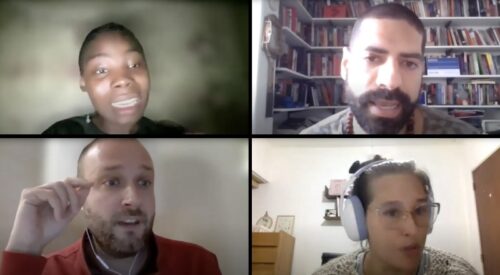For more than a decade, Wiki Education has bridged the realms of education and Wikipedia, supporting academics and students in U.S. and Canadian accredited institutions as they improve the world’s go-to source of information. But what does this approach to enriching Wikipedia look like worldwide?
Last month’s Speaker Series program, “Wikipedia and Education, globally”, explored this very question as our international panelists and attendees came together to examine the vast network of organizations and individual volunteers actively working at the intersection of Wikipedia and education.
Moderated by Wiki Education’s LiAnna Davis, the discussion featured program leaders from Nigeria, Argentina, Brazil, and Serbia, who shared histories of engaging students and instructors of all education levels with Wikipedia and offered insights on initiatives within their respective countries.
Wikimedia Serbia, one of the first groups in the Wikimedia movement to officially launch a Wikipedia and education program, collaborates with primary, secondary, and tertiary institutions to integrate Wikipedia into their curricula and enhance content on Wikipedia, Wikidata, and Wikibooks.
The perception of Wikipedia among educators in Serbia has evolved over time, noted panelist Nebojša Ratković of Wikimedia Serbia.
“In earlier stages, Wikipedia was often viewed with skepticism by educators in Serbia,” said Ratković. “Over time, as Wikipedia’s quality control mechanisms improved and efforts were made to enhance the accuracy and reliability of its content, educators in Serbia began to recognize the value of Wikipedia as a learning tool.”

Recognizing the shared experiences between the panelists, EduWiki Nigeria’s Bukola James echoed Ratković’s reflection on the evolution of educator perspectives surrounding Wikipedia.
“Once [educators] get more familiar with how Wikipedia works, they begin to really appreciate it, in fact, they preach the gospel of using Wikipedia in the classroom to their colleagues,” said James. “Introducing Wikipedia to them isn’t really about them using [the site], but also about exposing them to different kinds of open education resources that could help support their teaching and student learning in their classrooms.”
Wikimedia Argentina also has a longstanding history of supporting educators, having trained thousands of teachers and university instructors in pedagogical approaches to incorporating Wikipedia into their classrooms.
“Our turning point was during the pandemic,” explained panelist Luisina Ferrante of Wikimedia Argentina. “We were able to strengthen our networks with teachers and educational institutions, collaborate with public programs launched by the government in the context of the emergency, ally with public universities, and were more present than ever in designing open tools and resources.”
As the conversation turned to the future plans for each program, the four panelists considered the ever-changing political, educational, and technological landscapes in their respective countries. Each speaker underscored the importance of continuing to serve as the connection between education and Wikipedia, noting the invaluable social impact of high-quality, open-access information.
“When knowledge is limited to the walls of institutions, it fails to meet its objectives of contributing towards social improvement,” said Alexander Hilsenbeck Filho of Wiki Movimento Brasil. “It is important to disseminate knowledge and make it accessible to society so that it can be put to good use.”
Interested in hearing more from our panelists and other scholars featured in previous webinars? Catch up on our Speaker Series programs on YouTube, including “Wikipedia and Education, globally.”
Visit teach.wikiedu.org to learn more about the free resources, training, and support that Wiki Education offers to instructors in U.S. and Canadian accredited higher education institutions.

Interesting panel. The discussion reflected the status of Wikipedia in the educational sector, especially in the academic institutions. As a Faculty member, I will say that Wikipedia is trickling in, in the courses with the students.
However, many Faculty members are yet to accept it because of the conception of “not acceptable” for scholarly citation as anyone can edit. But then the developing is moving.